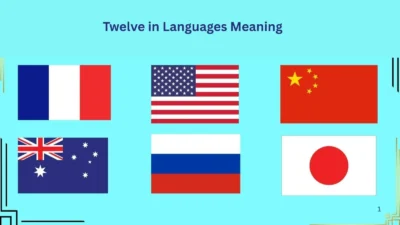Language is not just a tool for communication—it’s a gateway to understanding culture, travel, marketing, relationships, and expression. When someone searches for the words “twelve” and “luxurious” in different languages, they’re likely:
- Preparing content for an international audience.
- Traveling or relocating and need everyday vocabulary.
- Working in fashion, design, or hospitality and want to add elegance across cultures.
- Naming a brand, product, or campaign and want it to sound classy globally.
- Simply curious about how other cultures use these words.
This blog post solves that problem by giving you an in-depth look at both terms—their meanings, cultural context, and translations into many languages.
Whether you’re a writer, marketer, traveler, or language lover, you’ll walk away with the exact words and ways to use them across the globe.
—
The Word “Twelve” in Different Languages
“Twelve” is the number after eleven and before thirteen. It is a fundamental number in many cultures—think twelve months in a year, twelve zodiac signs, twelve hours on a clock.
Use cases:
- Telling time (e.g., “It’s twelve o’clock.”)
- Giving a quantity (e.g., “I bought twelve apples.”)
- Citing months, signs, or units (e.g., “The Twelve Apostles”)
Here’s how to say “twelve” in 20 different languages:
| Language | Word for “Twelve” | Pronunciation |
| English | Twelve | /twɛlv/ |
| Spanish | Doce | DOH-seh |
| French | Douze | DOOZ |
| German | Zwölf | TSVUHLF |
| Italian | Dodici | DOH-dee-chee |
| Portuguese | Doze | DOH-zay |
| Russian | Двенадцать (dvenadtsat’) | dvyeh-NAHD-tsaht’ |
| Arabic | اثنا عشر (ithnā ʿashar) | ith-NAH ashar |
| Chinese (Mandarin) | 十二 (shí’èr) | shuh-AR |
| Japanese | 十二 (jūni) | JOO-nee |
| Korean | 열둘 (yeol-dul) | yuhl-dool |
| Hindi | बारह (baarah) | BAA-rah |
| Turkish | On iki | on EE-kee |
| Greek | Δώδεκα (dódeka) | DO-the-kah |
| Dutch | Twaalf | TWAHLF |
| Swahili | Kumi na mbili | KOO-mee nah MBEEL-ee |
| Thai | สิบสอง (sìp-sŏng) | sip-sǒng |
| Hebrew | שתים עשרה (shteim esre) | shteym-ES-ray |
| Bengali | বারো (baro) | BAH-ro |
| Polish | Dwanaście | dvah-NASH-cheh |
—
The Word “Luxurious” in Different Languages
“Luxurious” is an adjective that means something is elegant, rich, indulgent, or of high quality. It’s used to describe experiences, products, places, or lifestyles that are lavish and not necessary—but desirable.
Use cases:
- Marketing: “A luxurious spa experience.”
- Fashion: “Luxurious silk fabric.”
- Travel: “Stay in a luxurious resort.”
- Personal taste: “She has a luxurious lifestyle.”
Here’s how to say “luxurious” in 20 languages:
| Language | Word for “Luxurious” | Pronunciation |
| English | Luxurious | /lʌɡˈʒʊəriəs/ |
| Spanish | Lujoso / Lujosa | loo-HOH-soh / -sah |
| French | Luxueux / Luxueuse | luk-SUH / luk-SUHZ |
| German | Luxuriös | look-soo-ree-UHS |
| Italian | Lussuoso | loos-SWOH-so |
| Portuguese | Luxuoso | loosh-WOH-zoo |
| Russian | Роскошный (roskoshnyy) | rahs-KO-sh-nee |
| Arabic | فاخر (fākhir) | FAA-kheer |
| Chinese (Mandarin) | 奢华 (shēhuá) | shuh-hwah |
| Japanese | 豪華な (gōkana) | GOH-kah-nah |
| Korean | 호화로운 (hohwaroun) | ho-hwa-RO-oon |
| Hindi | भव्य (bhavya) | BHUV-yah |
| Turkish | Lüks | luks |
| Greek | Πολυτελής (polytelís) | poh-loo-teh-LEES |
| Dutch | Luxueus | luks-uh-UHS |
| Swahili | Kifahari | kee-fah-HAH-ree |
| Thai | หรูหรา (rŭu-răa) | roo-rah |
| Hebrew | מפואר (mefo’ar) | meh-foh-AR |
| Bengali | বিলাসবহুল (bilāshbohul) | bih-LAASH-bo-hool |
| Polish | Luksusowy | look-soo-SOH-veh |
—
🧠 How to Use These Words in Real Conversations
Examples using both words in daily situations:
- “There are twelve luxurious villas on the island.”
- “We’re offering a twelve-course luxurious dinner.”
- “She booked a luxurious hotel for twelve nights.”
- “Twelve is a lucky number in many luxurious fashion houses.”
These phrases can be easily translated using the chart above depending on your target language.
—
Conclusion:
By learning how to say “twelve” and “luxurious” in different languages, you’re not only building vocabulary—you’re expanding your ability to connect with people worldwide. Whether you’re designing a product, crafting marketing language, writing poetry, or simply trying to impress someone abroad, these words carry universal value.
Bookmark this page, refer to it when needed, and embrace the elegance and precision of language—wherever you go.



